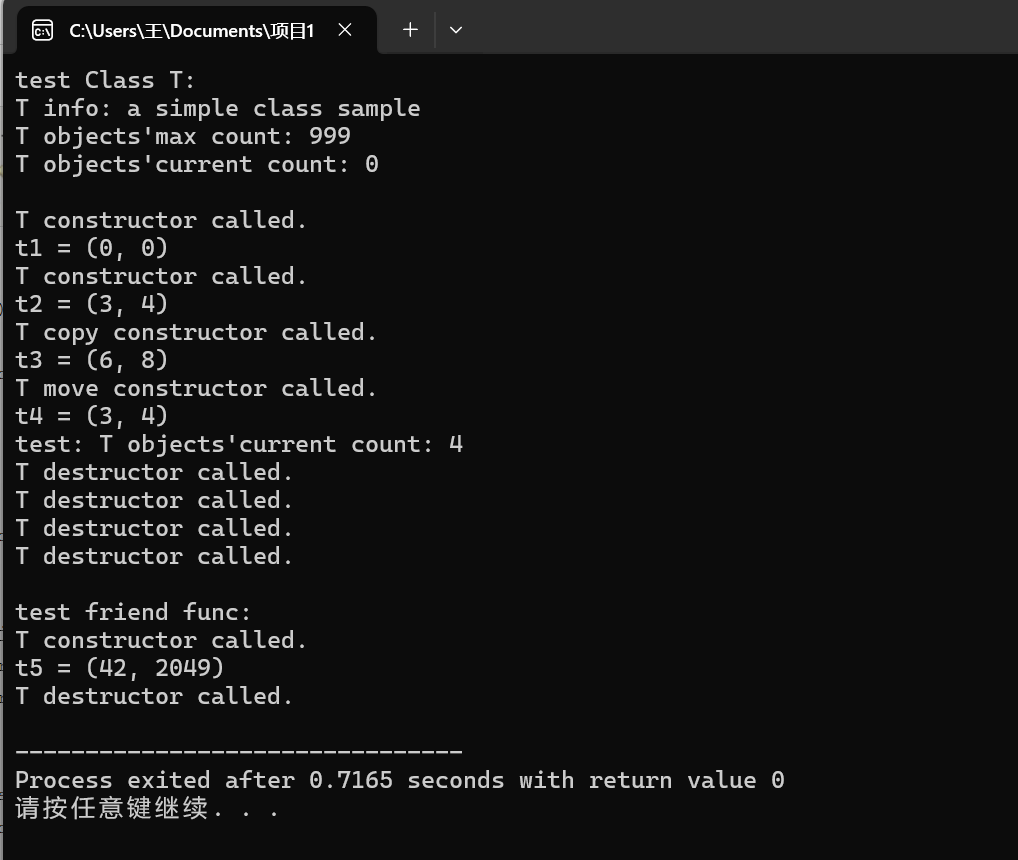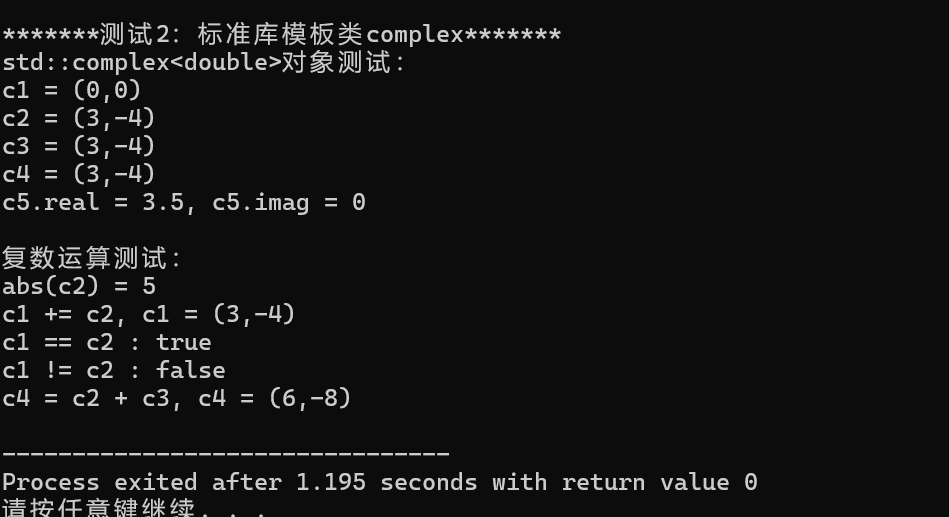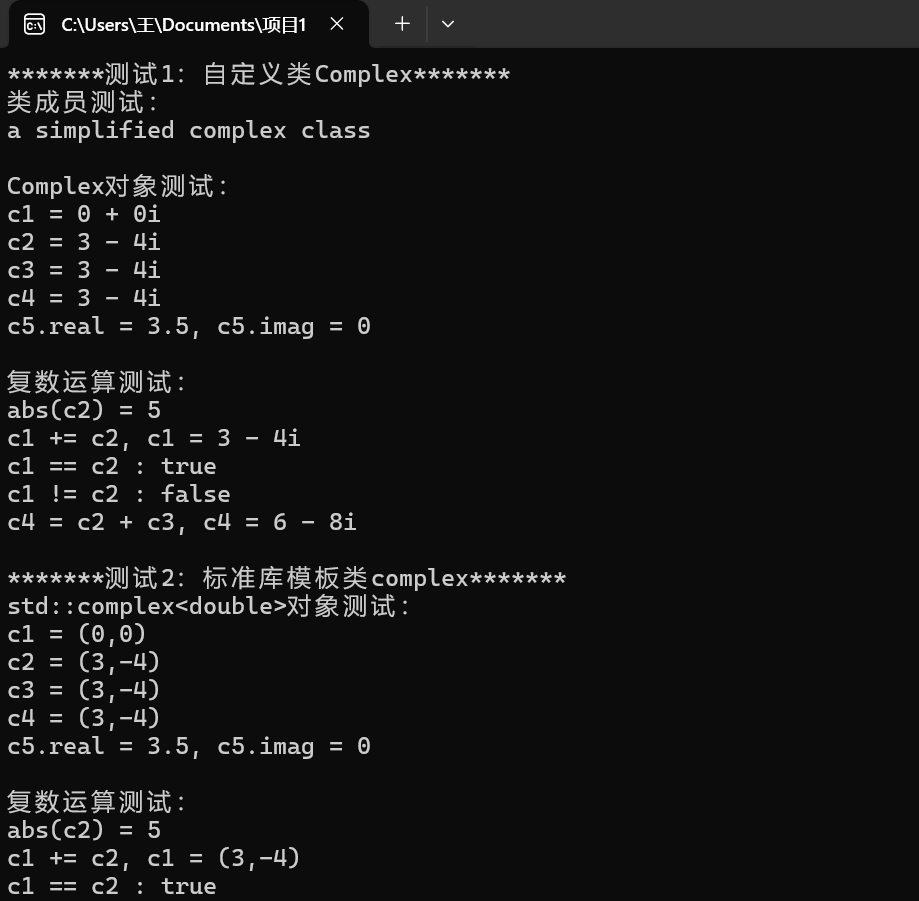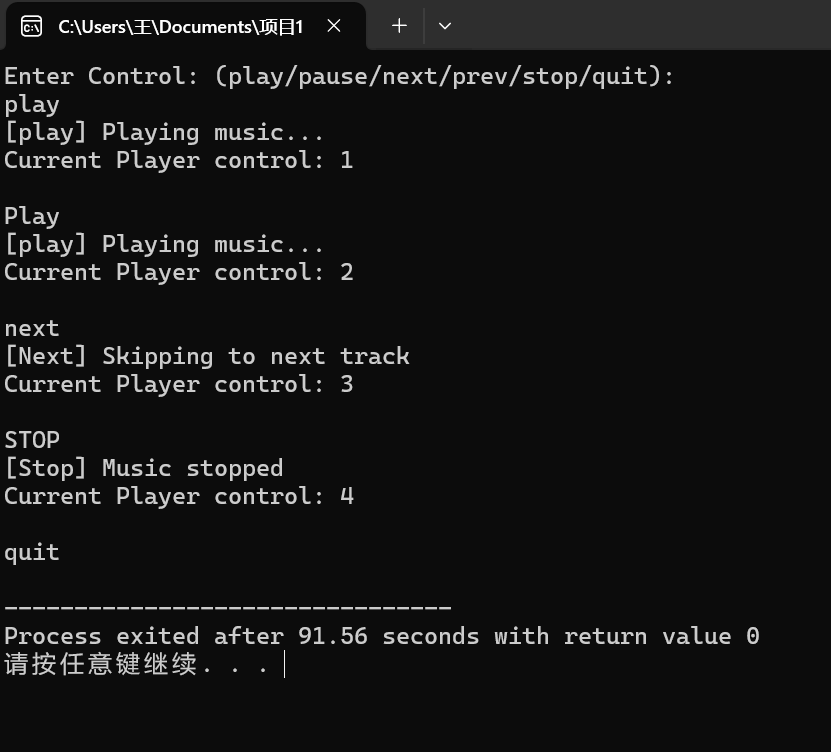任务1:
源代码task1.cpp
#include "T.h" #include <iostream> void test_T(); int main() { std::cout << "test Class T: \n"; test_T(); std::cout << "\ntest friend func: \n"; func(); } void test_T() { using std::cout; using std::endl; cout << "T info: " << T::doc << endl; cout << "T objects'max count: " << T::max_cnt << endl; cout << "T objects'current count: " << T::get_cnt() << endl << endl; T t1; cout << "t1 = "; t1.display(); cout << endl; T t2(3, 4); cout << "t2 = "; t2.display(); cout << endl; T t3(t2); t3.adjust(2); cout << "t3 = "; t3.display(); cout << endl; T t4(std::move(t2)); cout << "t4 = "; t4.display(); cout << endl; cout << "test: T objects'current count: " << T::get_cnt() << endl; }
T.h
#pragma once #include <string> // 类T: 声明 class T { // 对象属性、方法 public: T(int x = 0, int y = 0); // 普通构造函数 T(const T &t); // 复制构造函数 T(T &&t); // 移动构造函数 ~T(); // 析构函数 void adjust(int ratio); // 按系数成倍调整数据 void display() const; // 以(m1, m2)形式显示T类对象信息 private: int m1, m2; // 类属性、方法 public: static int get_cnt(); // 显示当前T类对象总数 public: static const std::string doc; // 类T的描述信息 static const int max_cnt; // 类T对象上限 private: static int cnt; // 当前T类对象数目 // 类T友元函数声明 friend void func(); }; // 普通函数声明 void func();
T.cpp
#include "T.h" #include <iostream> #include <string> // 类T实现 // static成员数据类外初始化 const std::string T::doc{"a simple class sample"}; const int T::max_cnt = 999; int T::cnt = 0; // 类方法 int T::get_cnt() { return cnt; } // 对象方法 T::T(int x, int y): m1{x}, m2{y} { ++cnt; std::cout << "T constructor called.\n"; } T::T(const T &t): m1{t.m1}, m2{t.m2} { ++cnt; std::cout << "T copy constructor called.\n"; } T::T(T &&t): m1{t.m1}, m2{t.m2} { ++cnt; std::cout << "T move constructor called.\n"; } T::~T() { --cnt; std::cout << "T destructor called.\n"; } void T::adjust(int ratio) { m1 *= ratio; m2 *= ratio; } void T::display() const { std::cout << "(" << m1 << ", " << m2 << ")" ; } // 普通函数实现 void func() { T t5(42); t5.m2 = 2049; std::cout << "t5 = "; t5.display(); std::cout << '\n'; }
运行结果截图:

问题1:YES
问题2:普通构造函数初始化对象,复制构造函数用已有对象初始化新对象,移动构造函数转移右值对象资源,析构函数清理对象资源,它们分别在对象创建、拷贝 / 传值返回、右值初始化、对象生命周期结束时调用。
问题3:YES
任务2:
源代码task3.cpp
#include "Complex.h" #include <iostream> #include <iomanip> #include <complex> void test_Complex(); void test_std_complex(); int main() { std::cout << "*******测试1:自定义类Complex*******\n"; test_Complex(); std::cout << "\n*******测试2:标准库模板类complex*******\n"; test_std_complex(); return 0; } void test_Complex() { using namespace std; cout << "类成员测试:\n"; cout << Complex::doc << "\n\n"; cout << "Complex对象测试:\n"; Complex c1; Complex c2(3, -4); Complex c3(c2); Complex c4 = c2; const Complex c5(3.5); cout << "c1 = "; output(c1); cout << endl; cout << "c2 = "; output(c2); cout << endl; cout << "c3 = "; output(c3); cout << endl; cout << "c4 = "; output(c4); cout << endl; cout << "c5.real = " << c5.get_real() << ", c5.imag = " << c5.get_imag() << "\n\n"; cout << "复数运算测试:\n"; cout << "abs(c2) = " << abs(c2) << endl; c1.add(c2); cout << "c1 += c2, c1 = "; output(c1); cout << endl; cout << boolalpha; cout << "c1 == c2 : " << is_equal(c1, c2) << endl; cout << "c1 != c2 : " << is_not_equal(c1, c2) << endl; Complex c6 = add(c2, c3); cout << "c4 = c2 + c3, c4 = "; output(c6); cout << endl; } void test_std_complex() { using namespace std; cout << "std::complex<double>对象测试:\n"; complex<double> c1; complex<double> c2(3, -4); complex<double> c3(c2); complex<double> c4 = c2; const complex<double> c5(3.5); cout << "c1 = " << c1 << endl; cout << "c2 = " << c2 << endl; cout << "c3 = " << c3 << endl; cout << "c4 = " << c4 << endl; cout << "c5.real = " << c5.real() << ", c5.imag = " << c5.imag() << "\n\n"; cout << "复数运算测试:\n"; cout << "abs(c2) = " << abs(c2) << endl; c1 += c2; cout << "c1 += c2, c1 = " << c1 << endl; cout << boolalpha; cout << "c1 == c2 : " << (c1 == c2) << endl; cout << "c1 != c2 : " << (c1 != c2) << endl; complex<double> c6 = c2 + c3; cout << "c4 = c2 + c3, c4 = " << c6 << endl; }
Complex.cpp
#include "Complex.h" #include <cmath> const std::string Complex::doc = "a simplified complex class"; Complex::Complex() : rea(0.0), imag(0.0) {} Complex::Complex(double r) : rea(r), imag(0.0) {} Complex::Complex(double r, double i) : rea(r), imag(i) {} Complex::Complex(const Complex& other) : rea(other.rea), imag(other.imag) {} double Complex::get_real() const { return rea; } double Complex::get_imag() const { return imag; } void Complex::add(const Complex& other) { rea += other.rea; imag += other.imag; } double abs(const Complex& c) { return std::sqrt(c.rea * c.rea + c.imag * c.imag); } Complex add(const Complex& c1, const Complex& c2) { Complex res; res.rea = c1.rea + c2.rea; res.imag = c1.imag + c2.imag; return res; } bool is_equal(const Complex& c1, const Complex& c2) { return (c1.rea == c2.rea) && (c1.imag == c2.imag); } bool is_not_equal(const Complex& c1, const Complex& c2) { return !is_equal(c1, c2); } void output(const Complex& c) { if (c.imag >= 0) { std::cout << c.rea << " + " << c.imag << "i"; } else { std::cout << c.rea << " - " << -c.imag << "i"; } }
Complex.h
#ifndef COMPLEX_H #define COMPLEX_H #include <string> #include <iostream> class Complex { public: static const std::string doc; Complex(); Complex(double r); Complex(double r, double i); Complex(const Complex& other); double get_real() const; double get_imag() const; void add(const Complex& other); friend double abs(const Complex& c); friend Complex add(const Complex& c1, const Complex& c2); friend bool is_equal(const Complex& c1, const Complex& c2); friend bool is_not_equal(const Complex& c1, const Complex& c2); friend void output(const Complex& c); private: double rea; double imag; }; #endif
运行结果截图


问题一:标准库模板类complex更简洁,有。
问题二:2-1:是。因为output需访问私有数据输出,abs需访问私有数据计算模长,add需访问私有数据进行复数相加,所以必须通过友元访问私有成员。
2-2:是
2-3:否。std::complex通过公有成员函数real()和imag()提供实部和虚部的访问。
问题三:在类Complex中显式删除复制构造函数,声明为Complex(const Complex&) = delete;,这样当出现Complex c4 = c2;形式的构造时,编译器会报错,从而禁用该构造形式。
任务3:
源代码task3.cpp
#include "PlayerControl.h" #include <iostream> void test() { PlayerControl controller; std::string control_str; std::cout << "Enter Control: (play/pause/next/prev/stop/quit):\n"; while(std::cin >> control_str) { if(control_str == "quit") break; ControlType cmd = controller.parse(control_str); controller.execute(cmd); std::cout << "Current Player control: " << PlayerControl::get_cnt() << "\n\n"; } } int main() { test(); }
PlayControl.cpp
#include "PlayerControl.h" #include <iostream> #include <algorithm> #include <cctype> int PlayerControl::total_cnt = 0; PlayerControl::PlayerControl() {} ControlType PlayerControl::parse(const std::string& control_str) { std::string lower_str = control_str; std::transform(lower_str.begin(), lower_str.end(), lower_str.begin(), [](unsigned char c) { return std::tolower(c); }); ControlType result = ControlType::Unknown; if (lower_str == "play") { result = ControlType::Play; } else if (lower_str == "pause") { result = ControlType::Pause; } else if (lower_str == "next") { result = ControlType::Next; } else if (lower_str == "prev") { result = ControlType::Prev; } else if (lower_str == "stop") { result = ControlType::Stop; } else { result = ControlType::Unknown; } if (result != ControlType::Unknown) { total_cnt++; } return result; } void PlayerControl::execute(ControlType cmd) const { switch (cmd) { case ControlType::Play: std::cout << "[play] Playing music...\n"; break; case ControlType::Pause: std::cout << "[Pause] Music paused\n"; break; case ControlType::Next: std::cout << "[Next] Skipping to next track\n"; break; case ControlType::Prev: std::cout << "[Prev] Back to previous track\n"; break; case ControlType::Stop: std::cout << "[Stop] Music stopped\n"; break; default: std::cout << "[Error] unknown control\n"; break; } } int PlayerControl::get_cnt() { return total_cnt; }
PlayControl.h
#pragma once #include <string> enum class ControlType {Play, Pause, Next, Prev, Stop, Unknown}; class PlayerControl { public: PlayerControl(); ControlType parse(const std::string& control_str); void execute(ControlType cmd) const; static int get_cnt(); private: static int total_cnt; };
运行结果截图

任务4:
源代码task4.cpp




 浙公网安备 33010602011771号
浙公网安备 33010602011771号